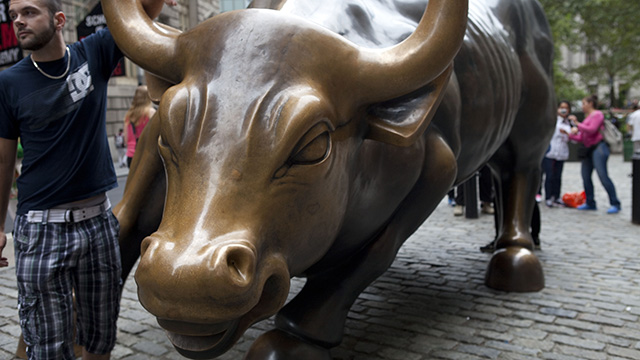This post first appeared at Campaign for America’s Future.
For so-called “masters of the universe,” Wall Street executives sure seem touchy about criticism. It seems they don’t like being painted as the bad guys.
But if they don’t like being criticized, why do so many of them keep behaving like B-movie villains? That’s exactly what executives from Citigroup, JPMorgan, Goldman Sachs and Bank of America looked like after an article appeared last week detailing their coordinated attempt to intimidate Sen. Elizabeth Warren (D-MA) and other Democrats who want to fix the mess on Wall Street.
They’ve cheated customers and defrauded investors. Now they want to use our legalized system of campaign-cash corruption to protect themselves from the very government which rescued them.
Dark Matters
According to a well-reported recent Reuters article, “Big Wall Street banks are so upset with US Democratic Senator Elizabeth Warren’s call for them to be broken up that some have discussed withholding campaign donations to Senate Democrats in symbolic protest.”
“Symbolic protest”? “Heavy-handed threat” is more like it. That sentence suggests that they’re seeking not only to punish Warren and her allies, but all Senate Democrats – presumably until they reduce or eliminate her influence within the party.
Although the Reuters piece cites only “a maximum of $15,000″ in potentially withheld contributions per bank, the threat is considerably greater than that. That maximum only applies to political party contributions from a PAC. (PACs can also contribute up to $5,000 to each individual candidate.)
But PACs aren’t where the action is. It turns out that the campaign contribution game isn’t all that different from Wall Street’s other financial activities: in both cases the real money’s in “innovative instruments.”
“Super PACs,” for example, can raise unlimited sums of money. They can then “spend unlimited sums to overtly advocate for or against political candidates,” as OpenSecrets.org explains. The list of 2014’s top 100 donors to these outside spending groups includes a number of Wall Streeters.
Bankers also contribute as individuals. When JPMorgan Chase CEO Jamie Dimon testified before the Senate Banking Committee about his bank’s “London Whale” fraud, for example, The Nation’s George Zornick pointed out that only two of the 22 senators facing him had not received campaign contributions from his bank’s employees.
As if to underscore the power of his connections, Dimon wore outsized cufflinks emblazoned with the presidential seal while giving his Senate testimony that day. (Apparently that’s a favored way for Dimon to signal his power to lesser mortals. As his bank was negotiating its way out of the foreclosure fraud scandal, he reportedly wore cufflinks featuring the FBI logo to Davos.)
Unsurprisingly, the senators were largely indulgent toward Dimon.
Then there are the “bundlers,” high-net-worth individuals who assemble large “bundles” of contributions from their peers and subordinates. They’re responsible for major cash infusions to campaigns from both parties.
Top bundlers for the 2012 Obama campaign included 92 people from the securities and investment community, according to a study by the Center for Responsive Politics. They included executives from such scandal-plagued institutions as Barclays, Citigroup and Goldman Sachs. (The Romney campaign failed to voluntarily provide a full list of bundlers, but CRP identified a number of bankers as well as 69 registered lobbyists.)
Spending is also skyrocketing for “dark money” groups, which are not required to disclose their donors. The banking industry is presumably well-represented there as well, although the veil of darkness surrounding these mountains of cash makes it impossible to know for sure.
We might have known, had the Securities and Exchange Commission followed through on plans to require publicly traded companies to disclose their political spending. But the SEC changed its mind, which may have been inevitable once prosecutor-turned-Wall-Street-lawyer Mary Jo White was selected to run it.
President Obama, who appointed White to that position, could do a lot to fix the dark money problem. As Lee Fang points out in The Nation, Obama could expose most of it with a stroke of the pen by requiring government contractors to disclose their contributions.
He should. The Brennan Center studied dark money in 13 of last year’s toss-up congressional races. It found that dark money dominated outside spending in those campaigns and that dark money constituted virtually all outside spending in seven of those races.
Shakedown Street
The Reuters article named four banks in last week’s not-so-subtle shakedown attempt: Citigroup, JPMorgan, Goldman Sachs and Bank of America. Each of these banks has been deeply implicated in a variety of massive, well-documented, multibillion-dollar frauds. Bankers at each institution were able to settle their fraud cases with shareholder cash – without facing jail time. And each bank took billions in government bailout money.
Readers may well wonder whether these banks are even permitted to band together for the purpose of blackmailing a political party. They are – campaign cash is “speech,” remember? But then, bankers collude with one another even when it’s not legal. (See here and here, for example.)
And why wouldn’t bankers engage in unlawful conspiracy and fraud? It’s not like any of them have gone to prison for it.
Does campaign cash correlate with good outcomes for Wall Street? Consider this: The “Citigroup amendment” to last year’s “Cromnibus” budget deal – so named because Citigroup lobbyists literally wrote much of the bill’s language – served the top five banks (including the four who so crudely threatened Democrats last week) very well.
Democrats who voted for that deal received twice as much in campaign contributions from the financial industry as those who voted against it.
Given all this, it’s not hard to see why Wall Streeters would target Warren and Democratic colleagues like Sherrod Brown (D-Ohio). (Sen. Bernie Sanders wasn’t mentioned, presumably because he’s not a Democrat.)
The rise of the Democrats’ “Warren wing” is a serious threat to the financial industry’s interests. It has enjoyed considerable influence over the party under Bill Clinton and Barack Obama, and the Warren wing poses a very real threat to that influence.
The Showdown
With the 2016 campaign coming up, this is a critical moment in the struggle for the Democratic Party. Venture capitalist Alan Patricof, described last year as a “longtime Hillary Clinton friend and bundler,” was asked in January whether “deep Democratic pockets” were enthusiastic about contributing to her campaign. Patricof said they’re “tripping over themselves” to contribute. He also said that Clinton is “very sensitive to … Elizabeth Warren trying to paint her as being identified with Wall Street.”
Bankers would presumably be far more comfortable investing in candidates who aren’t facing that kind of pressure.
In his defense, Patricof invests in actual businesses, ventures which are part of the productive economy rather than the ephemeral financial sphere. The four banks that threatened the Democratic Party last week are far more dependent on the Federal government – a government that allowed them to become too big to fail, bailed them out when they collapsed from their own fraud and mismanagement and has since allowed them to become bigger than ever.
The last thing these bankers want is a debate within the Democratic Party about reforming Wall Street and breaking up their too-big-to-fail institutions – a debate that could energize the “Warren wing” and leave finance-friendlier Dems on the defensive.
For her part, Warren was unfazed, describing the threat as “warning shot … a showy way to tell Democrats across the country to be scared of speaking out, to be timid about standing up and to stay away from fighting for what’s right.”
Added Warren: “Ok, they have taken their shot, but it will not work.”
Warren has it exactly right. Warren and her peers have started a conversation Wall Street doesn’t want us to have. She is to be commended for resisting the big banks’ undemocratic (and ungrateful) attack on the very system which saved them.
One thing is clear: This wasn’t just a threat against a few senators, or a Democratic Party faction. It was a naked attempt to crush public debate with campaign cash. That makes it an attack on democracy itself. If the big banks weren’t unpopular already, this undertaking would certainly help turn public opinion against them. They have made the case more convincingly than their critics ever could: We need to get money out of politics – and break up the big banks.
Warren and her allies clearly have public opinion on their side. Seventy-nine percent of voters have an unfavorable view of Wall Street. Eighty percent of voters in last year’s battleground states agreed that politicians do too much to support Wall Street and not enough for the middle class. Sixty percent favor stricter regulation of Wall Street.
But then, we’ve known it since the days of the B-movies: Americans hate to see the bad guys win.



